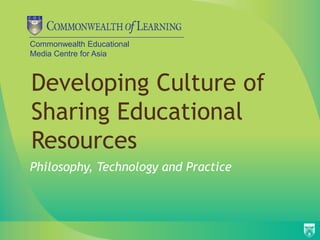Developing Culture of Sharing Educational Resources
- 1. Commonwealth Educational Media Centre for Asia Developing Culture of Sharing Educational Resources Philosophy, Technology and Practice
- 2. A Childhood riddle… What is it that does not get reduced after sharing with someone else? KNOWLEDGE
- 3. Role of Teachers What teachers do? – Explain – Interpret – Guide – Share – Write – Counselling – Assessing – Facilitate – Any other? What you do?
- 4. Meaning of Terms Author/Creator: is the originator of any written work Copyright: exclusive right given by law to the author/creator of a work What can be copyrighted? – Any work which is not an exact copy of someone else’s work Can ideas be copyrighted? No… only expression of ideas are copyrighted... Can copyright be transferred? Yes, an author can assign copyright to another person, as in the case of property
- 5. Knowledge Commons Who owns knowledge? Researcher stands on the shoulder of giants Previous research is necessary for new research Knowledge is Free – Information is not. Data Information Knowledge
- 6. Knowledge Resources Formats Books Periodicals A/V Media Online Web Resources – Text – Audio – Video – Graphics – Animation Learning Objects
- 7. History and Developments MIT OpenCourseWare, 2001 UNESCO Forum on the Impact of Open Courseware for Higher Education in Developing Countries, 2002 OLI-CMU, 2002 OER Paris Declaration 2012
- 8. OER: Definition teaching, learning and research materials in any medium, digital or otherwise, that reside in the public domain or have been released under an open license that permits no-cost access, use, adaptation and redistribution by others with no or limited restrictions. Open licensing is built within the existing framework of intellectual property rights as defined by relevant international conventions and respects the authorship of the work
- 9. What is “Open”? It’s about open license used to share educational material Reuse Revise Remix Redistribute No permission required as long as the open license is respected
- 10. Open Licenses Creative Commons CC-BY CC-BY-SA CC-BY-NC CC-BY-NC-SA CC-BY-ND CC-BY-NC-ND Concepts Attribution Share Alike Non-Commercial Non-Derivative
- 11. Technology and Platforms Wikipedia, Wikieducator, Wikivarsity Wikispaces, etc. Connexions MIT OpenCourseware OLI-CMU FlexiLearn OpenLearn OER Commons
- 12. Major issues Understanding open license Developing OER Finding and using OER
- 13. Searching OER Activity to search OER – Search one video on OER under CC license – Search a course in OER on a subject of your interest
- 14. Wiki-approach to content development and teaching Meaning quick, quick is a Hawaiian word, coined by Ward Cunningham in 2005 Popular example is Wikipedia User can edit the pages History of the page created can be checked and reverted back Courses are open to all Provides a collaborative learning platform to the learners
- 15. OER Use Case Study 1 • Open Education, 2007 • David Wiley taught a 3 credit course using Wiki • Used weekly reading and blogging • Assignments and grading • Over 50 learners took this course
- 16. OER use Case Study 2 • SLM Development, 2008 • Sanjaya Mishra trained 20 individuals to write self-learning materials • Used weekly reading and GoogleGroup • Wiki-based Tasks to develop SLM using wiki • Learning contract, certification, online activities, visible outputs
- 17. OER use Case Study 3 • Bangladesh Open School, SLM Training • F2F and Online training • Development of Units • Collaborative course Development
- 18. Wiki in Course Development MediaWiki Server can be configured to have two iteration of the same course content One for the Course Team, and the other for learners' access Course Team member work to prepare the materials that may require content expertise, media expertise (graphics, audio, video, animation), interaction expertise, and instructional design expertise Quality benchmarks can be developed to see that the material has reached certain level of maturity, and can be transported to the open access platform for the learners' use
- 19. Advantages of Wiki-based OER Updating and revision of courses become easy Learner participation in course, and their engagement will improve Some of the user generated content may be useful in revision Courses will become live and dynamic rather than static and outdated Quality of the course would improve as it will adhere to copyright regulations (as it will be open) Open content licensing policy can be adopted Courses can be developed fast using OER
- 20. Advantages of Wiki-based OER Print copies can be developed automatically using PediaPress PDF server Print-on-demand facility can be used Less paper use, and digital preservation of content with each editing recored Resources other than main text can also be integrated including Slideshare, YouTube, MindMap, Google Calender, etc. Online quiz, and self-assessment activities can be in- built within the learning material Discussion Forum can be built around lessons
- 21. Myths about Wikis Wikis are not reliable Anyone can edit wiki pages Using Wiki will make courses constructivist Wiki Courses does not need management Wikis promote plagiarism
- 22. Any one can teach WikiEducator – Registered users: 63,021 – Pages: 124,450 – Content pages: 20,062 Create user page and start contributing
- 23. THANK YOU

